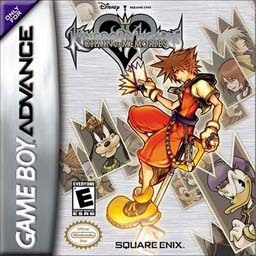Kingdom Hearts: Chain of Memories
Kingdom Hearts: Chain of Memories is a card based role playing game that was developed by Square Enix and released for the Nintendo GameBoy Advance on December 07, 2004.
| Developer: Square Enix Publisher: Square Enix Release Date: December 07, 2004 Platforms: GBA JustRPG Score: 85% Pros: +Appealing Characters. +Great Dialogue. +Fun card based combat. +Good soundtrack. Cons: -No replay value. -Convoluted story line. |
Kingdom Hearts: Chain of Memories Overview
Kingdom Hearts: Chain of Memories is a card based role playing game based off the popular video game series, Kingdom Hearts. In this version players use a card based system in order to battle enemies. The card system works very well and the game’s combat is still very active and quick. The story, much like other Kingdom Hearts games, is very convoluted and not easy to understand at first. Although after looking into it the story is in fact interesting and thoughtful. Overall the game is very solid for a card based game and fans of the franchise will find a lot to offer.
Kingdom Hearts: Chain of Memories Screenshots
Kingdom Hearts: Chain of Memories Featured Video
Kingdom Hearts: Chain of Memories Review
| Kingdom Hearts achieved the sort of success developers scarcely dare hope for. So it was no surprise when sequels were announced. It is, however, surprising the first of these sequels arrived in Game Boy Advance form. But more surprising still is how fully this pocket-sizedKingdom Hearts recreated the feel of its PlayStation 2 counterpart. |
|
Even apart from its cinemas (which make use ofKingdom Hearts’ field graphics), Kingdom Hearts: Chain of Memories manages to look a fair bit like Kingdom Hearts. Sure, it uses sprites, but they’re the biggest, most colorful, and most articulate sprites I’ve ever seen. For that matter, Kingdom Hearts has always had an animated quality, so sprites fit very well. Simply put, the game looks good. |
| On paper the music should fit just as well, since the vast majority of it is taken directly from the Kingdom Hearts soundtrack. But as someone who loved that soundtrack, I still find myself unimpressed. While the tracks have been faithfully transferred to a format that fits on a cartridge, music originally played by a full orchestra tends to sound like clutter on the Game Boy Advance’s single speaker. |
|
In Kingdom Hearts: Chain of Memories, cards control everything–the worlds you can visit, the content of those worlds, and your success in combat. The game flows like this–you first choose which world you’ll visit from among your world cards. Once there, you progress by opening doors with your stock of world cards. Within the unlocked rooms you will generally have to engage in combat. In battle you and the enemy move about, positioning yourselves so you can successfully cast cards. Cards are numbered from 0 to 9, where higher numbers can deflect the attacks of lower numbers. As well, up to three cards can be cast simultaneously, becoming harder to deflect and occasionally producing special attacks called sleights. There are downsides, of course. High number cards cost more to place in a deck, reducing the number of attacks you have before reloading. The first card used in a sleight cannot be reloaded until the next battle, so using sleights too often can leave you defenseless. Complex as all that sounds though, the mobility in battle and regularity of deflecting attacks combine to make Kingdom Hearts: Chain of Memories‘ play remarkably similar to Kingdom Hearts. |
| This system has some flaws, however. As with battle cards, map cards are also numbered, and doors have requirements in order to open such as the card being 5 or bigger. The trouble with this is the values on the cards are random, meaning a little bad luck can cause hours to be wasted just trying to get a card to open a door. Beyond that, the Game Boy Advance control scheme isn’t ideal for a game that requires as much movement as Kingdom Hearts: Chain of Memories, meaning it can be tricky to properly line up an attack. |
|
The story picks up where Kingdom Hearts left off, traveling down the roads through endless green fields. Beckoned by the promise of finding something dear, Sora follows the road into Castle Oblivion, a place where Sora’s own memories determine what he sees. But is any of it real, or is something toying with Sora’s very memories? |
| As you might guess from this setup, much of Kingdom Hearts: Chain of Memories involves visiting the familiar worlds of Kingdom Hearts. And though the stories are changed to better fit the memory theme of the new game, it is often times a little too familiar, a sort of ‘been there, done that’ feel. Still, the fresh content surrounding the old worlds was at least interesting, and seems to really set the stage for upcoming Kingdom Hearts sequels. |
|
Kingdom Hearts: Chain of Memories is surprisingly short on extras, considering the volume of them in its predecessor. The game can be finished in as little as 12 hours, short even by handheld standards. However, the game does boast a second storyline with a different playable character, which adds another 5 or 6 hours. For that matter, because it puts far less emphasis on the individual worlds, the second story held my attention much more easily. |
| At the end of the day, this is pretty much a must buy for anyone following the Kingdom Heartsseries. If you aren’t, it’s still a solid enough game, but considering how many times the game assumes one is familiar with Kingdom Hearts, I doubt you would enjoy it much. |
| Final Grade: 85% |
Kingdom Hearts: Chain of Memories Videos
Kingdom Hearts: Chain of Memories Trailer















